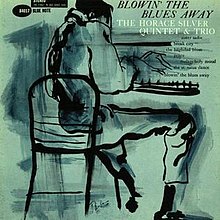From Wikipedia, the free encyclopedia
1959 studio album by Horace Silver
Blowin' the Blues Away jazz pianist Horace Silver , released on the Blue Note label in 1959 featuring performances by Silver with Blue Mitchell , Junior Cook , Gene Taylor , and Louis Hayes .[ 5]
Reception
The Allmusic review by Steve Huey awarded the album 4½ stars and states "Blowin' the Blues Away is one of Horace Silver's all-time Blue Note classics... one of Silver's finest albums, and it's virtually impossible to dislike".[ 6]
Track listing
All compositions by Horace Silver except as indicated "Blowin' the Blues Away" - 4:44
"The St. Vitus Dance" - 4:09
"Break City" - 4:57
"Peace " - 6:02
"Sister Sadie " - 6:19
"The Baghdad Blues" - 4:52
"Melancholy Mood" - 7:10
"How Did It Happen" (Don Newey ) - 4:41 Bonus track on CD Recorded August 29 (tracks 1, 6), August 30 (#3, 4, 5, 8) & September 13 (#2, 7), 1959.
Personnel
Production
References
Years indicated are for the recording(s), not first release .
Blue Albums Art /The With
Introducing Nat Adderley Love and Peace: A Tribute to Horace Silver Dee Dee Bridgewater , 1994)Byrd's Eye View Donald Byrd , 1955)Whims of Chambers Bohemia After Dark Kenny Clarke , 1955)Al Cohn's Tones Al Cohn , 1950)Miles Davis, Volume 3 Miles Davis Quartet Blue Haze Miles Davis Quintet Miles Davis All-Star Sextet Walkin' Miles Davis with Sonny Rollins Bags' Groove Quartet/Quintet/Sextet Lou Donaldson , 1952)Afro-Cuban Kenny Dorham , 1955)The Art Farmer Septet When Farmer Met Gryce Gigi Gryce , 1955)The Complete Roost Recordings Stan Getz , 1950–51)Nica's Tempo Disorder at the Border Coleman Hawkins , 1952)Milt Jackson Quartet Plenty, Plenty Soul Milt Jackson , 1957)The Eminent Jay Jay Johnson Volume 2 J.J. Johnson , 1955)Blowing in from Chicago Clifford Jordan & John Gilmore , 1957)Hank Mobley Quartet Hank Mobley Sextet Hank Mobley and His All Stars Hank Mobley Quintet J. R. Monterose Lee Morgan Indeed! Lee Morgan Sextet Sonny Rollins, Vol. 2 Clark Terry Selected
Years given are for the recording(s), not first release.
As WithLou WithPhilly WithSam WithJimmy WithHorace WithStanley With
Portrait of Cannonball Cannonball Adderley , 1958)Back to the Tracks Tina Brooks , 1960)Street Singer Jackie McLean , 1960)My Kind of Jazz Ray Charles , 1970)True Blue Al Cohn and Dexter Gordon , 1976)Silver Blue Al Cohn and Dexter Gordon , 1976)Dolo! Dolo Coker , 1976)California Hard Junior's Cookin' Junior Cook , 1961)Filthy! Papa John Creach , 1972)Red's Good Groove Red Garland , 1962)Green Is Beautiful Grant Green , 1970)Soul Mist! Richard "Groove" Holmes , 1966)Homecoming! Elmo Hope , 1961)Montara Bobby Hutcherson , 1975)The Soul Brotherhood Charles Kynard , 1969)The Blue Yusef Lateef Yusef Lateef , 1968)Rakin' and Scrapin' Harold Mabern , 1968)Jazz Blues Fusion John Mayall , 1971)Ten Years Are Gone Les McCann Ltd. in New York Les McCann , 1961)Can't Hide Love Carmen McRae , 1976)Capuchin Swing Jackie's Bag Hi Voltage Hank Mobley , 1967)Captain Buckles David "Fathead" Newman , 1970)Opus De Don Don Patterson , 1968)Oh Baby! Big John Patton , 1965)Breezing Sonny Red , 1960)Images Good Move! Freddie Roach , 1963)Takin' Care of Business Charlie Rouse , 1960)Open House Jimmy Smith , 1960)Plain Talk Sonny Stitt & the Top Brass Sonny Stitt , 1962)Soul Time Bobby Timmons , 1960)Steppin' Out! Harold Vick , 1963)The Caribbean Suite Spectrum Cedar Walton , 1968)The Electric Boogaloo Song Beyond Mobius Money in the Pocket Joe Zawinul , 1966)

